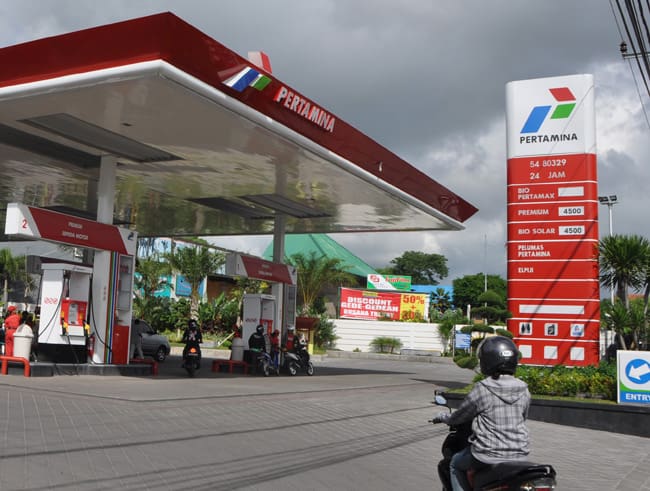
It has been quite a busy couple of weeks lately in Indonesia. Between the 5 suspected terrorists being shot in Bali and the ongoing riots over the rise in fuel prices, news reporters certainly have had their work cut out for them recently. It seems like all of that rioting wasn’t for nothing in the end, as over the weekend it was decided that the price of fuel will not be rising – for now at least.
It seems like quite an amazing display of power of the people that the riots, mostly based in Jakarta, were able to turn around the decision of the government. That is only part of the story however as certain sectors of the government had a large role in the decision. The Golkar Party, usually known as “the party of the people” were originally in agreement with the rise in fuel prices. After seeing the situation of the riots all over Indonesia the party rethought their decision as not being the best one for the people. It was voted upon despite many people literally walking out of the voting but in the end the price hike was overturned.
Prices will stay put for now but not forever
This new revelation is good news for those that were in disagreement with the price hike and those that can’t afford the higher rate but that doesn’t mean that prices won’t ever rise. The Golkar party opposed the price hike and will only support it if the Indonesia Crude Price (ICP), a collection of crude oil prices, rises to 15% above a budget forecast of for $105 per barrel. Currently the price is 10% above the budget forecast at $116 per barrel. Other parties have taken a similar stance with some only agreeing to raise prices when the ICP price is up by 20%
In simpler terms
To make things simpler, the people rioted and caused the Golkar party (party with second most seats in the parliament) to take notice and oppose the price hike. While the delay in prices rising isn’t an absolute direct effect of the riots, the riots surely helped to influence the decision. So prices will stay the same for now but will surely go up at a later date. Will there be more riots when the price of fuel finally gets proposed to be raised again? Only time will tell, but given the history of these issues, many are already anticipating it.

The people rioting and the government overturning their own decisions is one thing. It’s going on for years. The other side of the story are the heavy subsidies, Indonesia pays for keeping the price for gasoline artificially low. The country is now in the Top 5 of the countries with the lowest fuel prices worldwide. While that is good for the people and everyone who drives a car, bike or whatever vehicle – the subsidies are taking up a huge part of the GDP of the country, which can’t be good in the long run.
So while I certainly hope for prices to stay low forever, I also hope that Indonesia can sort out its subsidy problem. Otherwise it will be difficult to sustain a growing economy and elevate more citizens from poverty.
Yes Chris, I agree totally. Subsidization of fuel prices will not be a permanent solution for Indonesia. I’m afraid that a majority of the people protesting the issue of the rise in fuel prices don’t understand the bigger picture and only view it as a rise in their cost of living – something that will certainly go up if the price of fuel goes up. I also would like to see my cost of living including fuel prices stay the same but if that means that the entire economy of the country will eventually go belly up, I would prefer to pay a bit more here and there. Unfortunately, there are many people who cannot afford such luxuries. A very complicated situation for sure and one with no single solution that will work for everyone, at least in the present state of things.
Oh yeah, I forgot. Depending on whom you ask, the subsidies for fuel in Indonesia are anything between 11 and 25% of the GDP, which is an unhealthy and unsustainable level. Prices are so low in fact, that the country became a fuel importer a few years back, despite its abundance of natural resources and being an exporter since ages. Also it gets just to expensive to develop their own resources and sell them domestically for a set price, so the country has to import raw material from abroad.
I drive a motor-bike, my family owns three vehicles and I’m harshly against subsidies.
Subsidies don’t help with the inherent problems with the Indonesian transport system. The crippled roadways, aging airports and scandalous ports are in ruins. A country bearing the world’s fifth largest population of 240 million people, has a transportation system from the middle ages. Instead of using 11-25% of GDP to improve transportation infrastructure to reduce the need for cheap fuel, the subsidy goes up in fumes from grid-locked vehicles parked in metropolitan traffic. Which then goes on to become an air pollution issue affecting health, environment, and quality of life. A disservice leading to another disservice. The subsidy must go and infrastructure must begin.
Quality leadership is rare here and hard decisions are postponed endlessly. Difficult choices are left to the next shift, bouncing around from one ‘decision maker’ to the next until the issue is simply dropped. The policies of Indonesia are continuously frustrating. On one hand, you have the issue of corruption, politicians cheating the population to promote their own interests. On the other hand, you have ignorance, the population unable to grasp the implication of crippling subsidy programs.
Jingcho,
All excellent points you raise here which I agree with 100%. The problem is, even if this money didn’t go to subsidies, would it be able to stay out of the pockets of the people that control it or would it actually go to fixing all of the problems you address and more? We all know what the answer should be but that is rarely what happens in this country. Unfortunately, the general population probably doesn’t see it in the same way that you or I do as they are already used to their poor infrastructure as well as cheap, subsidized gas.
Recently I watched a program about the life of a trash collector in Jakarta and I began thinking about one thing, “Will Indonesia ever be a clean place to live?” It would require a major overhaul of all forms of infrastructure with most areas being leveled or paved over entirely. Kind of off-topic but an interesting thing to think about nonetheless.
Well put Raja Ajak,
I didn’t believe until recently that transportation had a chance of being improved. Living in Bali, I’m witnessing an transportation revolution. For years, I’ve watched as congestion and traffic has choked up our little piece of paradise. I’ve motored around in thick traffic, inhaling diesel fumes and cursing the government for negligence and corruption. I watch the calm faces around me that seem oblivious to the contamination and frustration, wondering to myself how everyone could remain so sanguine. Then a miracle happened.
Recently, as so often happens in Bali, all my wishes have come true. First they built a small turn off at the airport junction that effectively eliminated that traffic bottleneck in Jimbaran. Then a brand-new topping of asphalt on all the roads in Bali. Followed by a stone sidewalk in Kuta. Now a new airport scheduled to be open in a year. A new tunnel in the central round-about and a sky bridge across the harbor. My prayers have been heard!
Politicians are putting funds in the right projects. I’m not current on Indonesian news, but I don’t believe any of this had to do with the population complaining about traffic. At least not anywhere near the scale of the recent proposal to raise fuel prices. I do think that infrastructure would be a healthier thing to protest for instead of the riots we’re seeing now. My understanding is these projects have been brought onboard to make Indonesia look good for the 2013 APEC conference.
As for Jakarta, I couldn’t agree more. That city needs to leveled and rebuilt. Its a massive kampung. I saw a BBC special on filthy cities, and the focus was on Paris. The entire city had to be razed, block by block, open sewers drained and covered. And look at it now, you’d never know that it used to be one of the filthiest cities around.